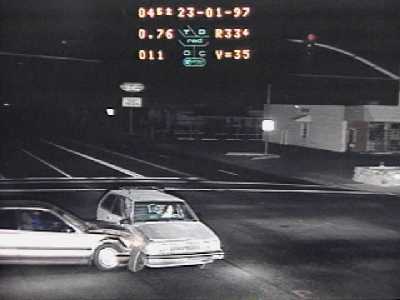
Image from Red Light Camera in Tempe, AZ
Yesterday the Times’ continued its crusade against traffic tickets when it took aim at red light cameras. According to the Times, red light cameras are primarily about raising revenue for the city, not making roads safer. The proof? 80% of tickets given out by machines are for right turn violations which the Times deems are “a less pressing safety concern.”
Less pressing for whom? When the Federal Highway Administration discusses the conflict between pedestrians and automobiles it ranks “right on red” as the top concern. A look at crash fatality statistics nationwide shows that in Los Angeles, almost one quarter of all crash fatalities are pedestrians.
To buffer it’s statement that right on red violations aren’t a concern, the Times tells the story of a woman who fought a red light ticket, believing that not coming to a complete stop before making a right on red, wasn’t illegal. Instead of being shocked that this woman has a complete lack of understanding of basic traffic laws, the Times repeats it’s claim that red light violations just aren’t a big deal (emphasis mine).
But it is the right-turn infraction -- a frequently misunderstood and less pressing safety concern -- that drives tickets and revenue in the nation's second-biggest city and at least half a dozen others across the county.
What follows next is a back and forth between engineers and other experts about the effectiveness or red light cameras in reducing cars crashing into pedestrians. This conversation is of course devoid of any statistics relating to how dangerous Los Angeles streets are to pedestrians.
The story ends by telling the story of another victim who got traffic tickets for breaking the law yet feels he doesn’t deserve them.
Motorists often are confused and complain about right-turn photo tickets, police say. John Jasso, a Pasadena technology manager, said he didn't fully get the complete-stop rule until two right-turn photo tickets came in the mail a week apart.
One was before sunrise on a Saturday morning. The streets were largely deserted, he recalled, as he braked and rounded a corner heading to the Montebello golf course.
The second ticket, before the first arrived in the mail, involved another early trip to a golf course, he said.
"I was like, 'They've got to be kidding me.' Especially at 6 in the morning," he said. The first ticket cost him $381; the second was dismissed because of a paperwork error, he said.
Jasso thinks focusing cameras on right turns is mostly about generating cash.
But he admits it changed how he approaches signalized corners.
"Now I stop every single time," he said. "No matter what time of day or night."
Imagine that.
Photo: Alderbooks.com





